Argentina
Born Under a Feisty Star: Muhammad Ali, the Original Mr. October
The World Series is almost over, and the notion that the month of October is the right month for certain athletes to pave their way into immortality
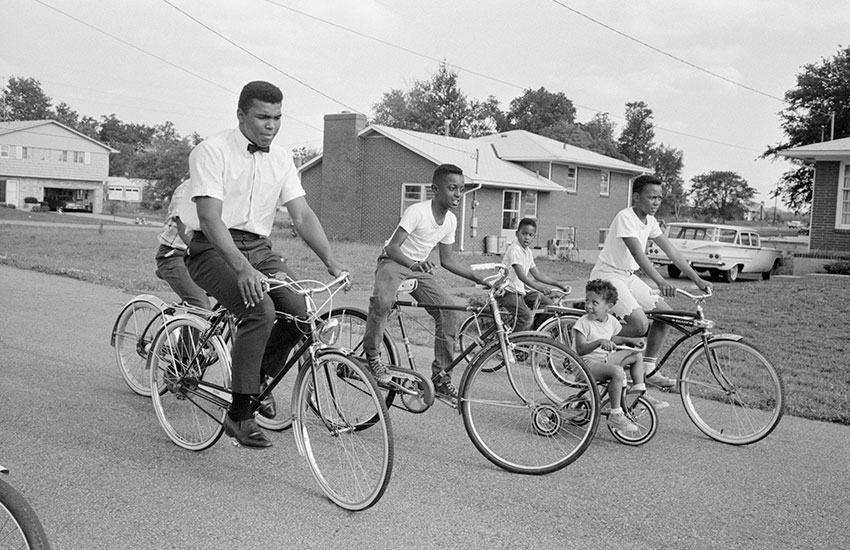
The World Series is almost over, and the notion that the month of October is the right month for certain athletes to pave their way into immortality is once again reaffirmed. Moreover, those of you who believe that there are only twelve different ways in which our destiny can play out depending on the random alignment of the stars may find this article reassuring. Yes, dear baseball fans and delusional star-gazers: there appears to be a real chance that our horoscope may make it more likely for us to succeed in certain days or months. And just like Saturday night is alright for fighting, then it is possible that October is the month to take our brawling ways to another level.
Or at least, that is what this analysis of the career of Muhammad Ali seems to suggest.
Many years before Yankees slugger Reginald Martinez Jackson terrorized pitchers in post-season games after luring them into dismissing his power with a sub-par performance during the regular season, a young lad who had just lifted a gold medal in the 1960 Olympics in Rome exploded on the boxing scene under the colorful (and appropriately evocative of the old Roman emperors and senators who founded his Olympic stage) name of Cassius mega splash inflatable water slide Marcellus Clay Jr., embarking on a quest that would put him in the ring in every continent but Antarctica against foes of all races and nationalities and transform him into the most recognizable face on Earth, among other accomplishments.
His career was marked, in many ways, by several landmarks and defining bouts through the next 20 years. His public life was a long series of events that took the boxing world and then the mainstream by storm, like an unstoppable runaway freight train. But that train made several important stops during one specific month of the year along the way, and many of them defined his life and his career to produce some of the most memorable sporting events of the 20th century.
His debut took place in his hometown on a chilly October night, and twenty Octobers later he effectively ended his career with a defeat at the hands of his protégé and former sparring partner, much in the manner of the old Caesar who died at the hands of Brutus. In truth, Ali did have one more fight after that, one last ill-advised comeback against all odds and defying all logic as it was his custom, just to ruin my otherwise brilliant analogy even though I was already chosen to write this article just by virtue of being born in… yeah, you guessed it: October (the 14th, in case you wonder).
As another October ends, we reminisce on the most extraordinary boxing career of Muhammad Ali with a look at the six-game World Series that turned him into a legend and which may one day give the “Winter Classic” a run for its money:
October, 1954 – The Killer of the Two-Wheeler
Legend has it that it was on a chilly night in October of 1954 that young Cassius and his brother Rudy rode their Schwinn bikes to the Columbia Auditorium in their native Louisville only to find that the bikes were gone by the time they exited the building.
(http://cyclingmagazine.ca/sections/news/muhammad-alis-career-inspired-stolen-bike/)
The rage that boiled in young Cassius’ blood after this act of petty larceny led him in a search for the nearest police officer, who was also a boxing coach in a nearby basement gym. After a short explanation and a subsequent invitation by officer Joe Martin to train as a boxer before going on a search-and-destroy mission against the thieves, young Cassius joined the gym at the tender age of 12, and six weeks later he won his first amateur bout.
There are no reports, however, of his eventual fight against the thief, or of the eventual retrieval of his beloved red bike. But soon enough, the original motive for Clay’s involvement in boxing was forgotten, and other, more powerful reasons to drive his career were found. After all, a stolen bike wasn’t much to ride on (if you pardon the pun) when trying to summon enough rage and courage to change the world. Clay emerged from that basement with a mission that would last for the rest of his life, unknowingly embarking on a road that would lead him to fill the shoes of barbaric men such as Sullivan, Dempsey and many others, and he did it fueled only by the anger over a stolen bike.
October 29th, 1960 – The Birth of the Louisville Lip
Cassius Clay W6 Tunney Hunsaker, Louisville, Kentucky
Backed by a group of powerful local businessmen, Clay made his pro debut only a few months after his Olympic feat in his hometown, unknowingly starting a career that would soon enough eclipse the fabled Louisville Slugger as the most powerful sport product ever to come out of the city. With no prior involvement in boxing in his family prior to this, the young Cassius had very few role models to follow, and boxing was a large white canvas in which he used the influence of his father, an artistic painter, to craft his own stylish ring aesthetics. He was a floating butterfly breaking out of his cocoon, a buzzing bee sharpening its sting and learning how to inflict damage. And he did inflict just enough damage on the hapless Hunsaker to grab a points win that would become the first step of a long and glorious career.
October 26th, 1970 – War is Over, Time to Fight Again
Muhammad Ali TKO 3 Jerry Quarry, Atlanta, Georgia
After famously rejecting the call of duty to join the army and then join the war in Vietnam, Ali fought one of his lengthiest and stressful battles against the US government, claiming that his war was not in the fields of Southeast Asia but in the streets and fields of his homeland, where his people was suffering the same inequalities and brutality that is still causing major athletes to take a stand (or a knee, eventually) against it even today.
Even though he finally managed to avoid significant jail time and to resume his life and his career, Ali hardly emerged as the winner in this fight. He lost what would have been the best years of his career in his quarrel against the establishment, but he finally had the chance to start all over again, and that’s what he did. For that purpose, he took on tough-as-nails contender Jerry Quarry in his comeback bout. With his country and the world watching and still waging their own war to decide whether to revile or revere him, Ali showed a few flashes of his old self and got a stoppage win that kept his unbeaten streak alive when a terrible cut over Quarry’s left eye forced his corner to throw in the towel after three rounds. This once again served as a reset point to move forward in a parallel fight that transcended the ring. He fought the establishment. He didn’t fight IN the war. He fought THE war itself and defeated it, and in the process he showed the world that hurting people for money and killing them for free are not the same types of violence. The violence of the war would soon stop, but the fight that Ali started when he refused to go to Vietnam still echoes today.
October 30th, 1974 – A New Dawn in the African Jungle
Muhammad Ali TKO 8 George Foreman, Kinshasa, Zaire
Ali found a way to have the first leg of his career managed by well-intentioned businessmen who offered him a great deal. But later in life, taking his act worldwide without the help of casino money (not as easily available back then as it is now), would mean that he would have to find creative sources of financing, something that his new and colorful promoter Don King would do quite successfully by courting dictators and shady political figures around the world.
The fight was billed as the triumphant return of the most outstanding musicians and athletes of the African diaspora, with a music festival lasting through the night to finally give way to the fight at dawn, but an untimely injury on Foreman caused the postponement of the bout, and the concert had to be done in the original date of late September while the fight was moved until the now mythical date of October 30th, 1974, the day of the “Rumble in the Jungle,” one of the most scrutinized, over-reported and analyzed sporting events in history.
Indeed, the victory gave Ali one of his most memorable and crowning accomplishments, becoming one of the greatest comeback wins ever in any sport and even preserving the now long forgotten name of Zaire, a country that still exists only to refer when Ali and Foreman’s names are pronounced, like the name of a long-disappeared dinosaur mentioned only to honor his killer, or a lost city in which a treasure was buried and can only be unearthed by the mention of its creator.
October 1st, 1975 – Hell on Earth
Muhammad Ali TKO 14 Joe Frazier III, Manila, The Philippines
In hindsight, it is incredible that only 11 months after his punishing win in Zaire, Ali was able to withstand this absolutely brutal fight under a 110-degree heat in an unbreathable environment and come out victorious, and with fights against Chuck Wepner (which created the basis for the Rocky franchise, not a minor side accomplishment), Ron Lyle (a demolishing affair) and Joe Bugner in between.
Just like in the case of the Zaire fight, this one is one of the most scrutinized bouts ever, and needs no further comments or introductions to describe its brutality and its excruciating effort. Its dramatic ending, with Ali completely exhausted in is corner being asked to stand up just to show Frazier that he could continue, only to have Frazier remain seated in defeat, is pure magic, and it can only be attributed to one thing: the miraculous qualities that the month of October exerts on Ali. Or at least, that’s the way the proponents of the virtues of the horoscope would like it to be.
October 2nd, 1980 – The Passing of the Torch
Larry Holmes L TKO 10 Muhammad Ali, Las Vegas, Nevada
It is said in the world of jazz that “you’re as good as your last solo.” And if we’re allowed one more baseball analogy, we must admit that Ali’s last at-bat was his most disastrous ever, and a sign for him to finally call it quits.
In what could be seen as a cynical episode of Monday morning quarterbacking by the quarterback himself, Ali’s personal physician Ferdie Pacheco notes that the fighter’s decay was the product of an unusual amount of punishment to the body that Ali received almost willfully, on a dare, after losing his extraordinary mobility under the accumulation of years of punishment. (His dull affair against wrestler Antonio Inoki was perhaps the beginning of the end for Ali’s leg work, since the Japanese-Brazilian fighter was only allowed to kick Ali in the legs and thus gave him severe blood clots in his lower body that slowed him down for good.) According to Pacheco, the damage done to Ali’s abdomen organs altered his digestive and blood-filtering abilities, and some of the medication he took for that (under Pacheco’s watch, we must assume) only made things worse. The result was a reduced mobility that turned the fleet-footed Ali into a sitting target for Holmes’ powerful hands, and the subsequent beating accelerated the progress of Ali’s Parkinson Syndrome symptoms.
This will be a subject of eternal discussion, of course, but the result remains the same. Only God knows what organ failed him first, if any, or what the triggering event was that led to Ali’s disastrous downfall against Holmes, and later against Trevor Berbick in his last fight, and from then on until his death.
Science, as usual, will find the answer only a minute too late, and Ali’s experience, as Oscar Bonavena famously once said, will be just like any other experience: “a comb that you get as a gift on the day you get bald.” Whether Ali’s luck ran out, or whether he finally got the comeuppance that many of his detractors felt he deserved, remains debatable.
One thing, however, became clear on that fateful night in Las Vegas: Ali’s romance with the month of October was, after many beautiful and passionate encounters, finally over.
Check out more boxing news on video at The Boxing Channel.
-
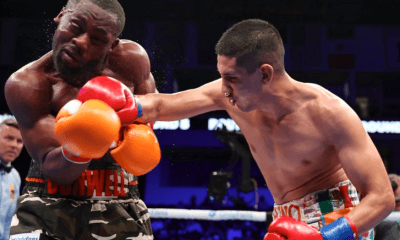
 Featured Articles4 weeks ago
Featured Articles4 weeks agoJorge Garcia is the TSS Fighter of the Month for April
-

 Featured Articles2 weeks ago
Featured Articles2 weeks agoThomas Hauser’s Literary Notes: Johnny Greaves Tells a Sad Tale
-
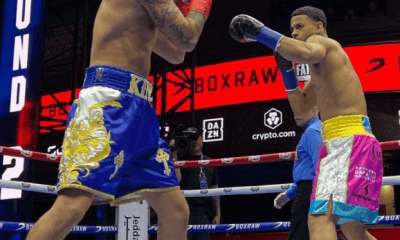
 Featured Articles4 weeks ago
Featured Articles4 weeks agoRolly Romero Upsets Ryan Garcia in the Finale of a Times Square Tripleheader
-
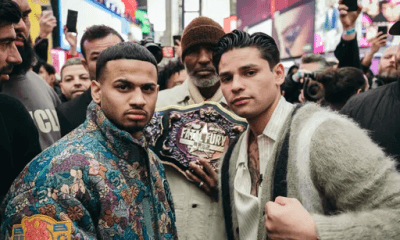
 Featured Articles4 weeks ago
Featured Articles4 weeks agoAvila Perspective, Chap. 324: Ryan Garcia Leads Three Days in May Battles
-
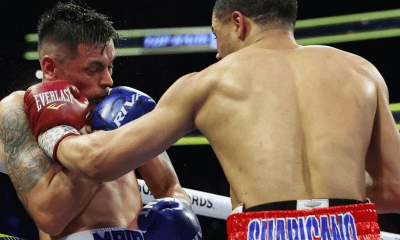
 Featured Articles3 weeks ago
Featured Articles3 weeks agoUndercard Results and Recaps from the Inoue-Cardenas Show in Las Vegas
-
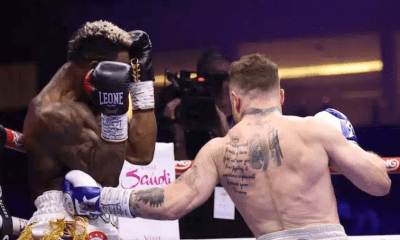
 Featured Articles3 weeks ago
Featured Articles3 weeks agoCanelo Alvarez Upends Dancing Machine William Scull in Saudi Arabia
-
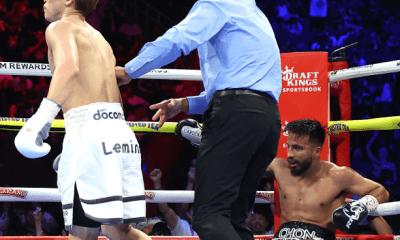
 Featured Articles3 weeks ago
Featured Articles3 weeks agoBombs Away in Las Vegas where Inoue and Espinoza Scored Smashing Triumphs
-
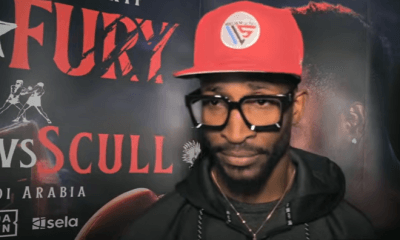
 Featured Articles3 weeks ago
Featured Articles3 weeks agoArne’s Almanac: The Good, the Bad, and the (Mostly) Ugly; a Weekend Boxing Recap and More



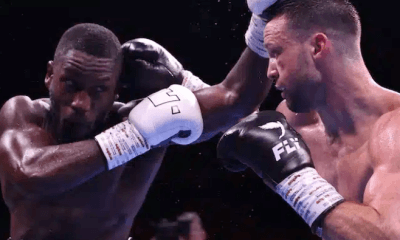

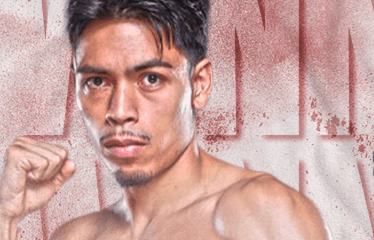

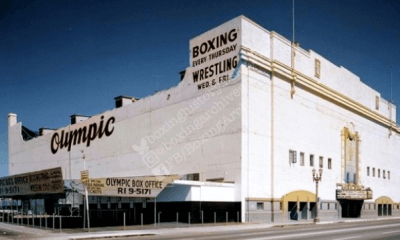

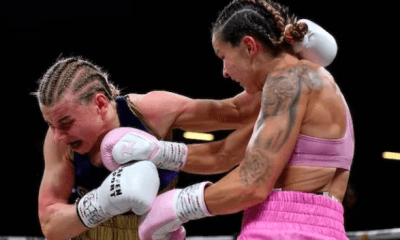

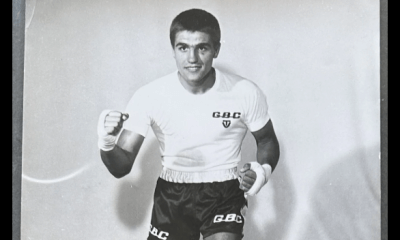












0 Comments